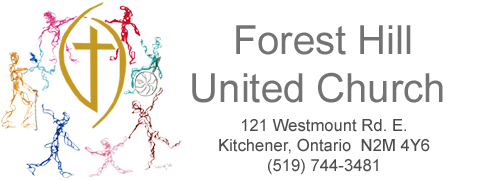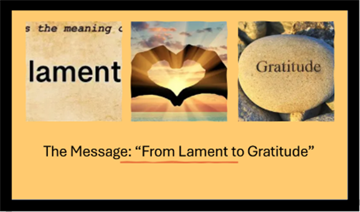From Lament to Gratitude
October 12, 2025
It is Thanksgiving weekend, and it is right and good that we should have communion on Thanksgiving weekend. I say that because in what’s called the Prayer of Thanksgiving and Consecration is an attitude of gratitude. There is thankfulness written right into the prayer at the very beginning. Remember the words, “Let us give thanks to the Lord our God.” and the response from the congregation is, “It is right to give our thanks and praise.” Right there at the core of our most important sacrament is thankfulness to God.
The theologian the Rev. Dr. Margit Ernst Habib says these words of the sacrament are not as solemn as they may sound and tend to characterize not just some kind of lofty Sunday morning worship feeling, but every part of Christian living. That thankfulness ought to find its way into our mundane, ordinary, trivial and everyday life. So much so that we see it as our Christian duty to show ourselves as grateful to God with our whole life. At the heart of this thankfulness is a realization that we are not independent, self-made men, and women. I was reflecting on the group of billionaires today that think of themselves and proclaim themselves to be self-made billionaires. And I thought how ludicrous that is. Nobody and I mean, nobody is self-made. First, we have to thank our parents, the ones who literally made us. We have to be thankful to others who supply our food; and thankful for our education, and; thankful for our clothing and we have to be thankful for our heat and our electricity and thankful for… well the list goes on and on and on. None of us are self-made, and none of us are self-sustained. And every one of those self-made billionaires stands on the shoulders of thousands perhaps hundreds of thousands of workers doing the hard work of making one or two people billionaires. This realization that we do not live ‘independently from’ but ‘dependently on’ others ought to make us thankful and thankful that others can rely on us.
But the gospel lesson today reminds us that this thankfulness is not, nor has it ever been universal. In the story of the healing of the 10 lepers all 10 are healed. All 10 know that this healing is not of their own hand. Now it is possible that some think that just by their own walking, they have made themselves well. So, I have nobody to thank but myself. Whereas the Samaritan understands that he did nothing to deserve, to create, or to bring about his own healing. By naming the grateful leper as a Samaritan, the writer of the gospel of Luke heightens a sense of surprise in the listener that only one in 10 has the where with all to give thanks. Samaritans were not supposed to understand, at the same depth, God’s love for them, and yet clearly, this Samaritan, experiences that love and the healing that comes from it. In the scripture it says, the Samaritan the ‘turned around’ and came back to thank Jesus. Once again Rev. Habib says that in Luke, and in the New Testament in general, ‘turning around’, is a description of the believers reaction, to the works of Jesus. It is not an accident, and it is filled with deep theological, emotional, and spiritual meaning. It describes the movement of the whole person, initiated by God’s gracious works. So, Jesus’s words, “your faith has made you well”, refer, therefore not just to the medical healing of the Samaritan, but to the holistic healing of him as a human being. Emotional, social, spiritual and physical healing has taken place.
In other words healing and salvation cannot be disassociated from one another. Just as feeding, and this central sacrament of our lives can be dissociated. Eating, whether it is on a protein bar, a late-night snack or a Thanksgiving feast is meant to connect us each to one another and to remind us that others have made this meal possible and by the grace of God we have had a hand in the feeding of others. The good news in this story is twofold. One is that thankfulness is not a pre-condition for being healed by Jesus. And that is good news because truthfully, we have some work to do on being fully thankful. And secondly that even if you’re not invited to a Thanksgiving feast, you can still be thankful because the simple act of eating connects us to others who may not be at the same table but have the same reasons to be thankful?
Gratitude in Samaritan shows us that he has moved from lament to Thanksgiving. This is important and the prophet Jeremiah tells us why.
Jeremiah is counselling his brothers and sisters who have been carried off into captivity in Babylon. Great is their lament over having lost their country, their homes, their property, and probably many relatives. How can they move forward from such a devastating list of losses? How can they even think of living in this foreign land little own being thankful? What Jeremiah says is that to live in this country will require a change, a ‘turning around’ from seeing Babylon as a place of exile to seeing it as a new home. A turning around from Babylonians as being the enemy to being their neighbor. This is why Jeremiah says “seek the welfare of the city in which you live” because now it is your city and your neighbour, as well as your own people who now depend on you and you on them. Be thankful for your life. Grateful for the opportunity to make something new from the ashes of what has been and grateful for the promise of what can be.
Last week I was part of a National Zoom presentation hosted by our church magazine, Broadview. Part of the discussion was the scary news that our church has been crunching the numbers. Of the 20,0000 church buildings across denominational lines in Canada, 9000 will close in the next 10yrs. The United Church of Canada stands to lose 65% of it’s membership in that same time period. So, what can we do?
Luckily the magazine had invited a city planner (whose name I forget) She said, “You have done some great work at getting these number and projecting the future but do yourself a favour and stop focusing on those numbers those laments. Focus rather on your neighborhood and how you and your churches can answer the needs of the people there. In other words, “Seek the wellbeing of the city in which you life.” And be grateful for the opportunity to feed others and to be fed by them. Be led into the future by gratitude and not lament because gratitude will lead us to a very different place. Amen

